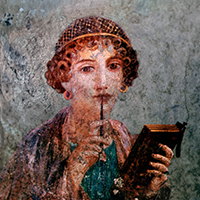Profile of Sappho
Died : Greece
Sappho, an iconic figure of the Archaic period in Greece, was a pioneering lyric poet from the island of Lesbos, flourishing around 630 to 570 BCE. Her life coincided with a time of political and social transformation, which saw the rise of the polis, the city-state, as the central unit of Greek life. Sappho's poetry emerged from this vibrant cultural milieu, reflecting the intimate and personal rather than the epic narratives that characterized the era of Homer. She belonged to an aristocratic family and led a thiasus, a community of women engaged in the arts and worship of deities such as Aphrodite. Her work, though now mostly lost, was highly regarded and widely circulated in antiquity, influencing subsequent generations and earning her a place among the revered Nine Lyric Poets. The fragments that survive offer a window into the rich literary and social traditions of her time, where poetry served both personal expression and communal functions.

